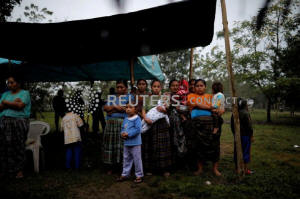|
Jakelin Caal traveled with her father to a remote stretch of
U.S. border in Antelope Wells, New Mexico, where they turned
themselves in to border agents on Dec. 6. They were among tens
of thousands of Central American migrants who have attempted to
cross the U.S. southern border in recent months in a bid to
escape poverty or violence in their home countries.
After U.S. border officers took them into custody, Caal grew
increasingly ill and was taken to a hospital in El Paso, Texas,
where she died on Dec. 8.
The autopsy by El Paso County's medical examiner, found that
Caal died of "sequelae of Streptococcal sepsis," an often deadly
reaction to infection or bacteria.
But the release of Caal's autopsy and the pinpointing of her
cause of death are unlikely to resolve the larger questions
about how migrants are treated in the hands of authorities.
"The clinical course and autopsy findings are those of a rapidly
progressive infection, with prompt systemic bacterial spread and
substantial clinical deterioration," the report said.
The strep bacteria were found throughout Caal's major organs,
including her lungs, adrenal gland, liver, and spleen, the
report said.
Caal's death fueled criticism from opponents of U.S. President
Donald Trump's immigration policies, which have sought to
discourage migrants from seeking haven in the United States. The
White House said the Trump administration was not to blame for
the death, but critics, including Democrats in Congress, said
detained migrants should have more medical attention in border
facilities to prevent such cases.
On Friday, Trump, in an apparent reference to Caal's death, told
reporters that her father "gave the child no water for a long
period of time."
Caal's family had previously said she was in no medical distress
when she and her father arrived at the border and that they had
received enough food and water on their journey.
A DHS account of her death, released in December, said an
initial medical screening of Caal had found no health issues,
and that the father had denied that he or his daughter were ill.
Shortly after Caal's death, a second Guatemalan child, a boy of
8, died after being detained by U.S. border agents. Afterwards,
the Trump administration announced DHS policy changes aimed at
preventing deaths of children in custody, including more
thorough medical checks.
(Reporting by Julio-Cesar Chavez, Writing by Yeganeh Torbati;
Editing by Richard Chang)
[© 2019 Thomson Reuters. All rights
reserved.] Copyright 2019 Reuters. All rights reserved. This material may not be published,
broadcast, rewritten or redistributed.
Thompson Reuters is solely responsible for this content.

|
|






